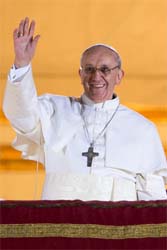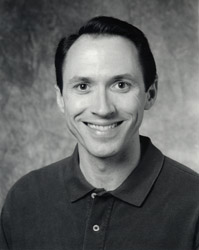The choice of Cardinal Jorge Mario Bergoglio as the 266th pope marks a series of firsts for the Catholic Church. Bergoglio, who took the name Pope Francis, is the first Latin-American pope and the first pope from the Jesuit order. He took his name from a medieval patron saint of Italy who came from a wealthy family and took a vow of poverty, which is part of the Jesuit tradition. He was elected pope during a time of turmoil amid hopes that he can set a new direction and rejuvenate the Catholic Church.
Dugan McGinley, who teaches in the Department of Religion at Rutgers and specializes in contemporary Catholicism, religion and sexuality – outlines a path for the new pope to restore faith and trust in the Catholic Church and reach out to the gay community. McGinley is the author of Acts of Faith, Acts of Love: Gay Catholic Autobiographies as Sacred Texts. He recently published an essay, “A Modern Plague? AIDS and Religion in American Society,” in Religion, Death and Dying.

McGinley: I think this is very significant because the Jesuits, while not a monolithic group, have a track record of combining thoughtful, intelligent scholarship with service to the Church and the world. This means he has been trained in a tradition that really does attempt to think critically and consider all sides of any disputed questions. This could go a long way in making him a true bridge-builder in the Church -- between the liberal and conservative extremes -- and in society -- between "Western" values and other global values. In this spirit, it would be a grand gesture to reaffirm the teachings of Vatican II by emphasizing what was new and innovative in the Council documents, rather than de-emphasizing their radical nature as Pope Benedict XVI tended to do. After all, by choosing the name Francis (after St. Francis of Assisi), he has signaled that he wants to do something new. Truly finding solidarity with the poor and marginalized, as he seems to have some track record of doing in Argentina, is a wonderful first step.
Rutgers Today: From the viewpoint of American Catholics, what is the most critical issue facing the church as Francis I begins his papacy?
McGinley: The most critical issue is
the loss of credibility of the leaders of the Catholic Church as serious
promoters of human dignity. We see this first of all in the hierarchy's
missteps in the sexual abuse scandals. They put the protection of priests and
bishops over the concerns of the victims. We also see this in their problematic
and selective application of the concept of religious liberty, which Vatican II
teaches is part and parcel of human dignity. Church leaders assert the freedom
of conscience as a right for the Church in society, but not within the Church.
To some degree, every Catholic picks and chooses what is most important to him
or her in Church teaching on matters up for debate in society. By maligning some
of these people and not others, the leaders contribute to the rift in Catholicism
between so-called liberal and conservative camps. Pope Francis would do well to
affirm the good intentions of all Catholics in his flock.
Rutgers Today: How should Francis I
go about restoring the faith and trust of Catholics
alienated by the sexual abuse scandal?

Rutgers Today: The pope has a record
as a relatively traditional churchman and has opposed same-sex marriage. How
might he go about reaching out to gay people?
McGinley: I doubt he will consider
any significant shift in Church teaching on homosexuality. Still, the resources
are already there to reach out to gay people. The Church explicitly teaches that
gay people are to be treated with dignity, respect and love. The pope could
demonstrate this by asking to hear firsthand about their experience in the
Church and society, and encourage bishops to do likewise. As for gay marriage,
he and all Church leaders should take seriously the difference between civil
marriage and sacramental marriage. They already recognize this in Church
teaching on marriage -- what it means to be "married in the Church."
Taking steps not to block gay marriage in the civil realm would demonstrate
that the Church really does believe in the concept of religious freedom and the
freedom of conscience.
Rutgers Today: And how might the new
pope reach out to women?
McGinley: The pope needs to accept the fact that gender equality is built into the Christian message. We have learned too much about the social construction of gender to pretend any longer that roles within the Church must be based on biology. This needs to be fully integrated into Church teaching.
Media Contact: Ken Branson
732-932-7084 ext. 633
E-mail: kbranson@ur.rutgers.edu